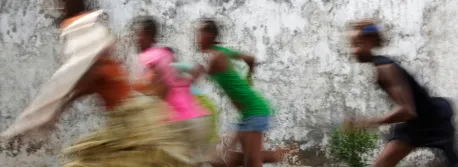
Children in War and Conflict
UNICEF helps save and protect child victims of war and violence through evidence-based interventions and response services in more than 140 countries. Learn more, including how to help.
Some 400 million children – about 1 of every 5 – are living in or fleeing from conflict zones
Over 400 million children live in countries where there is war or other violent conflicts. Often forced to flee their homes in search of safety, many remain displaced for extended periods of time, or never return home. Some are orphaned or separated from parents and caregivers.
Over half of all civilians killed by landmines and explosive remnants of war are children. Verified attacks on children have tripled since 2010.
UNICEF is working alongside partners to meet the urgent needs of children impacted by wars in places such as Gaza, Sudan, Syria, Ukraine and Yemen.
Recurring violence also endangers children in Burkina Faso, Central African Republic (CAR), the Democratic Republic of the Congo (DRC), Haiti, Nigeria and South Sudan. Boko Haram, a violent Islamist insurgency, has terrorized communities around West Africa's Lake Chad Basin for years.
In all of these countries and regions, UNICEF and partners are there, delivering lifesaving support.
Children are especially vulnerable to abuse, exploitation and trafficking during emergencies and armed conflicts. And as violence against children increases, perpetrators are rarely held accountable for the killing, maiming, sexual violence, abductions and armed recruitment of children, or for attacks on schools and hospitals.
How UNICEF is helping child caught in conflict
UNICEF works with governments and partners all around the world to prevent and respond to violence against children. That work is done in collaboration with governments and across the health, education and other social sectors – including the justice system – and with partners in business, civil society, faith-based organizations and the media.
At the national and local levels, UNICEF works to:
- help strengthen laws and policies to improve public service delivery for children and families in their homes, communities and schools
- support parents and caregivers through parenting initiatives
- consult young people to ensure their voices are heard and views leveraged to help shape UNICEF programming
- work in communities to address harmful behaviors and social norms communities and advocate for social change that promotes safer environments
UNICEF plays a pivotal role in establishing global alliances and setting technical guidance to comprehensively address violence against children. By improving data availability and building evidence, we help raise awareness, enhance political will and hold decision makers to account.
Specific interventions and program efforts include:
providing emergency relief to children impacted by war, including medical care, safe water and sanitation, hygiene kits and more
caring for and working to reunite children who have been separated from their families
creating and supporting Child-Friendly Spaces that give children a safe space to rest, play, learn and receive psychosocial support
helping to dismantle systematic sexual abuse — often a weapon of war — and providing recovery services to victims
protecting children from military conscription, facilitating the release of child soldiers and supporting their reintegration back into their communities
supporting millions of children in areas affected by landmines and explosive weapons with prevention and survivor assistance interventions
UNICEF calls on all warring parties to abide by their obligations under international law; and to immediately end violations against children and the targeting of civilian infrastructure, including schools, hospitals and water sources.
UNICEF also calls on states with influence over parties to conflict to use that influence to protect children.
Learn more about what UNICEF is doing to protect children in conflict and safeguard their rights.
Guidance for parents and caregivers: How to talk to your children about conflict and war.
Help UNICEF reach more children in conflict zones with lifesaving assistance and protection services. Donate today.





